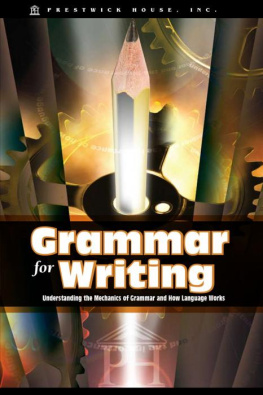 The author and publisher have provided this e-book to you for your personal use only. You may not make this e-book publicly available in any way. Copyright infringement is against the law. If you believe the copy of this e-book you are reading infringes on the authors copyright, please notify the publisher at: us.macmillanusa.com/piracy . A rule is just a style with an army. ANDREW SCHWALM (A play on the more well-known quotation from an unknown student of the Yiddish linguist Max Weinreich: A language is just a dialect with an army and navy.) Contents Introduction People are often moved and challenged by nuggets gleaned on a daily basiswhether from a spiritual devotional, a tip-a-day calendar, or a regularly e-mailed newsletter.
The author and publisher have provided this e-book to you for your personal use only. You may not make this e-book publicly available in any way. Copyright infringement is against the law. If you believe the copy of this e-book you are reading infringes on the authors copyright, please notify the publisher at: us.macmillanusa.com/piracy . A rule is just a style with an army. ANDREW SCHWALM (A play on the more well-known quotation from an unknown student of the Yiddish linguist Max Weinreich: A language is just a dialect with an army and navy.) Contents Introduction People are often moved and challenged by nuggets gleaned on a daily basiswhether from a spiritual devotional, a tip-a-day calendar, or a regularly e-mailed newsletter.
But there are few groups who need constant encouragement more than writersit is, after all, a mostly solitary practice. The Grammar Devotional , then, is here to help you: it has daily reminders of our basic tenets ( who versus whom , anyone?); inspiring profiles of writers and grammarians who have helped English evolve to what it is today; and quizzes, word scrambles, and word searches to help solidify newly learned tips. English is a messy language. Unlike French, we dont have a council to decide how we should write or speak. We only have a multitude of competing college handbooks, dictionaries, and usage and style guides, such as The Chicago Manual of Style and The Associated Press Stylebook , which frequently disagree. Space is tight in this book, and I like to keep things simple, but wherever possible I point out when something is a style rather than a rule.
Too many people go around believing the way they learned to do things is the only way to do things, when really its just one of the acceptable choices. As you will see, the book is organized by generic weeks so you can start any time. Its meant to be read through, just like a devotional, but weve also included an index so you can use the book as a reference guide and quickly find specific tips when you need them. Most of the time, punctuation is on Monday, Language Rock Stars are on Wednesday, quizzes and word scrambles are on Friday, and word search puzzles and cartoons are on Sunday, although I occasionally deviate from this pattern to keep related entries together. It may seem like a trivial endeavor, a tip each day, but at the end of a year the knowledge adds up. A years worth of new knowledge can imbue your writing with new confidence.
Heres to better e-mail messages, essays, marketing materials, articles, and novels. Week 1 Monday The Burger of McDonalds: Making Possessive Names Possessive Have you ever wondered how to make a possessive name such as McDonalds , Carls , or St. Anthonys possessive? The short answer is dont! Rewrite the sentence to avoid such a construction because, technically, youre supposed to add another apostrophe or apostrophe and s on the endwhich looks ridiculous. McDonaldss earnings were super-sized last quarter. (technically correct) McDonalds earnings were super-sized last quarter. (better) An explanation for why there are two competing technically correct answers can be found .  Week 1 Tuesday I Love You: Subject Versus Object To figure out things such as when to use who or whom or lay or lie , you need to be able to identify the subject and object of a sentence.
Week 1 Tuesday I Love You: Subject Versus Object To figure out things such as when to use who or whom or lay or lie , you need to be able to identify the subject and object of a sentence.  Week 1 Tuesday I Love You: Subject Versus Object To figure out things such as when to use who or whom or lay or lie , you need to be able to identify the subject and object of a sentence.
Week 1 Tuesday I Love You: Subject Versus Object To figure out things such as when to use who or whom or lay or lie , you need to be able to identify the subject and object of a sentence.
Fortunately, its easy! The subject is the person or thing doing something, and the object is having something done to it. Just remember the sentence I love you . I is the subject. You is the object of the sentence and also the object of my affection. Hows that? You are the object of my affection and the object of my sentence.  Week 1 Wednesday Language Rock Star: Jed Hartman and the Law of Prescriptivist Retaliation Hartmans Law of Prescriptivist Retaliation, coined by technical writer Jed Hartman in his Web-based column, Words & Stuff ( http://www.kith.org/logos/words/words.html ), states that any article or statement about correct grammar, punctuation, or spelling is bound to contain at least one error.
Week 1 Wednesday Language Rock Star: Jed Hartman and the Law of Prescriptivist Retaliation Hartmans Law of Prescriptivist Retaliation, coined by technical writer Jed Hartman in his Web-based column, Words & Stuff ( http://www.kith.org/logos/words/words.html ), states that any article or statement about correct grammar, punctuation, or spelling is bound to contain at least one error.  Week 1 Wednesday Language Rock Star: Jed Hartman and the Law of Prescriptivist Retaliation Hartmans Law of Prescriptivist Retaliation, coined by technical writer Jed Hartman in his Web-based column, Words & Stuff ( http://www.kith.org/logos/words/words.html ), states that any article or statement about correct grammar, punctuation, or spelling is bound to contain at least one error.
Week 1 Wednesday Language Rock Star: Jed Hartman and the Law of Prescriptivist Retaliation Hartmans Law of Prescriptivist Retaliation, coined by technical writer Jed Hartman in his Web-based column, Words & Stuff ( http://www.kith.org/logos/words/words.html ), states that any article or statement about correct grammar, punctuation, or spelling is bound to contain at least one error.
It is sometimes also known as McKeans Law after lexicographer Erin McKean or Skitts Law for alt.usage.english ( http://www.alt-usage-english.org ) contributor Skitt, both of whom appear to have independently made the same observation. Any errors you find in this text were put there intentionally as a test to see if you are paying attention. Honest.  Week 1 Thursday So Many Talents: Not OnlyBut Also When not only is followed by but also (or simply but ), its considered good form to make sure the parts that follow each set of words are formatted the same way. He is not only a great swimmer , but also a great musician . (Bad: the sentence uses a noun clause and a verb clause. (Bad: the sentence uses a noun clause and a verb clause.
Week 1 Thursday So Many Talents: Not OnlyBut Also When not only is followed by but also (or simply but ), its considered good form to make sure the parts that follow each set of words are formatted the same way. He is not only a great swimmer , but also a great musician . (Bad: the sentence uses a noun clause and a verb clause. (Bad: the sentence uses a noun clause and a verb clause.
Its bad because they dont match.) You could make the second example better by rewriting it with two verb clauses: He not only swims with ease , but also plays amazing music .  Week 1 Friday Quiz: Youre Welcome Which of the following is incorrect? a. Squiggly received a warm welcome. b. Please welcome Squiggly. c.
Week 1 Friday Quiz: Youre Welcome Which of the following is incorrect? a. Squiggly received a warm welcome. b. Please welcome Squiggly. c.
Squigglys arrival was a welcome distraction. d. Youre welcomed. e. They welcomed Squiggly to the family. f.
Welcome! The answer and an explanation are .  Week 1 Saturday A Supposed Rule: Supposedly Versus Supposably It would be much easier if I could tell you that supposably isnt a word, but I cant. It is a word, but the problem is that supposably doesnt mean the same thing as supposedly and most people use it incorrectly. The word you usually want is suppos ed ly , which means roughly assumed to be true and almost always includes a hint of sarcasm or disbelief: Supposedly, he canceled our date because of a family emergency. She supposedly sent the check, but it was lost in the mail. Supposably means supposable, conceivable, or arguably.
Week 1 Saturday A Supposed Rule: Supposedly Versus Supposably It would be much easier if I could tell you that supposably isnt a word, but I cant. It is a word, but the problem is that supposably doesnt mean the same thing as supposedly and most people use it incorrectly. The word you usually want is suppos ed ly , which means roughly assumed to be true and almost always includes a hint of sarcasm or disbelief: Supposedly, he canceled our date because of a family emergency. She supposedly sent the check, but it was lost in the mail. Supposably means supposable, conceivable, or arguably.
It is only a valid word in American English; the British wisely refuse to accept it. 
Next page






 The author and publisher have provided this e-book to you for your personal use only. You may not make this e-book publicly available in any way. Copyright infringement is against the law. If you believe the copy of this e-book you are reading infringes on the authors copyright, please notify the publisher at: us.macmillanusa.com/piracy . A rule is just a style with an army. ANDREW SCHWALM (A play on the more well-known quotation from an unknown student of the Yiddish linguist Max Weinreich: A language is just a dialect with an army and navy.) Contents Introduction People are often moved and challenged by nuggets gleaned on a daily basiswhether from a spiritual devotional, a tip-a-day calendar, or a regularly e-mailed newsletter.
The author and publisher have provided this e-book to you for your personal use only. You may not make this e-book publicly available in any way. Copyright infringement is against the law. If you believe the copy of this e-book you are reading infringes on the authors copyright, please notify the publisher at: us.macmillanusa.com/piracy . A rule is just a style with an army. ANDREW SCHWALM (A play on the more well-known quotation from an unknown student of the Yiddish linguist Max Weinreich: A language is just a dialect with an army and navy.) Contents Introduction People are often moved and challenged by nuggets gleaned on a daily basiswhether from a spiritual devotional, a tip-a-day calendar, or a regularly e-mailed newsletter. Week 1 Tuesday I Love You: Subject Versus Object To figure out things such as when to use who or whom or lay or lie , you need to be able to identify the subject and object of a sentence.
Week 1 Tuesday I Love You: Subject Versus Object To figure out things such as when to use who or whom or lay or lie , you need to be able to identify the subject and object of a sentence.